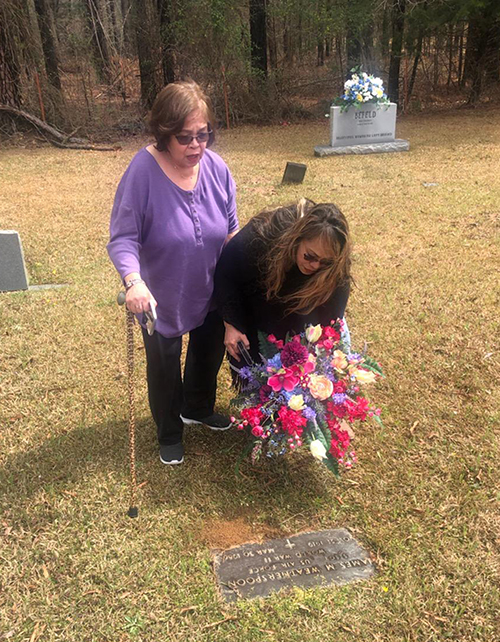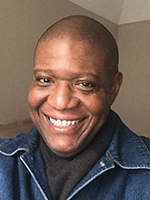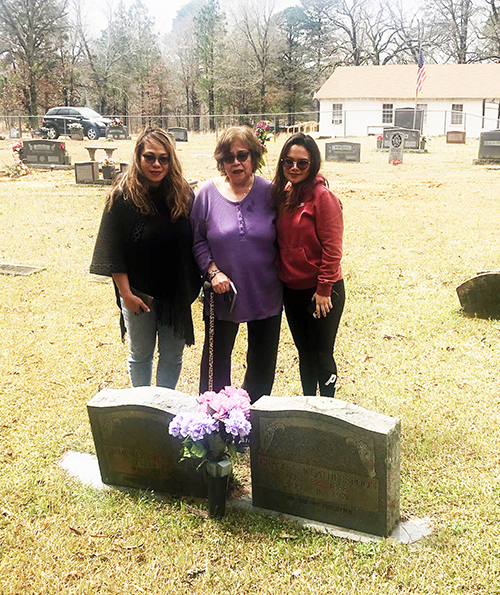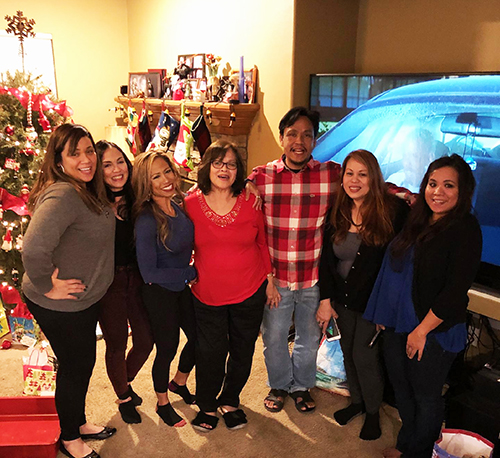
Corazon Weatherspoon watches over daughter Cheryll Jackson’s shoulder as she lays a wreath on the grave of James M. Weatherspoon at Oak Hill Cemetery in Ashdown, Ark. (XAVIER JACKSON)

By Xavier Jackson
She is my mother-in-law and among the rarest individuals I have had the honor of knowing in my life. Her easy smile radiates an inner beauty and quiet dignity found in few people. We had journeyed to the Golden State for an auspicious occasion. She was turning 70 on Christmas Eve and her six children, who had not all been together since she emigrated to the United States from the Philippines, planned to surprise her with a reunion.
I affectionately call her Mama Cora. The reunion was far more than that. It was the restoration of a severed connection — a joyous and blessed homecoming. My tiny Grinch heart grew 10 sizes that day. Bearing witness was truly my honor. The broken family was finally reassembled after 23 years; and it was glorious. They welcomed me, and, in spite of my hypersensitivity to disapproval or biases, I felt accepted.
My wife, Cherryll and her two children, Renee and Rixx, had only arrived in the United States less than a year before after a protracted wait for their own visas and green cards. Cherryll and I were engaged right before making the trip west. This family loves America so much that it shames me to not love it more. They got that from Mama Cora. She and my wife have no time for those who have entered America illegally. They sacrificed so much to do it the right way. Sneaking in offends them deeply and should offend me more.
That immigration discussion is not one you want to stumble into blindly with my wife or her mother. Do remember that.
Amerasian by birth
Mama Cora is the child of James M. Weatherspoon, an American Army lieutenant who, according to his daughter, served on General Douglas MacArthur’s staff. Growing up in the Philippines, the mixed-race spawn of an American GI, she suffered racist taunts and beatings in her homeland though she had done no wrong — repeatedly tried and convicted by the crime written in the features of her young face. Her mother’s tales of her gallant officer father instilled a love in her for the man who abandoned them. In spite of never meeting him, a connection was somehow made … and held for a lifetime.
Being the would-be son-in-law with a big mouth, I promised to take her to find where he was buried should she make it to Illinois. And to quote Samuel L. Jackson in Pulp Fiction, “God got involved.”
An enduring footprint of an American military presence is suffering children. U.S. Armed Forces left the Philippines in 1992, but failed to bring all the Americans home. The children of American troops are called “Amerasians” in the Philippine Islands, and are known as the lost children. In Vietnam they are called Bui Doi, which means the “dust of life.” They did not choose to be born of soldiers barely past adolescence, desperate for comfort, and irrevocably immersed in the horrors they witnessed daily in the Mekong Delta, Hue and Da Nang while serving in another war in Vietnam. The mothers who bore these children were often forced to choose prostitution over starvation.
The dollar went a long way in the cities, bars and houses of ill repute near Subic Bay in the Philippines. Americans were royalty. Exploitation of the locals was not discouraged or even noticed. It is likely that our soldiers perpetrated assaults, rapes and murders while running roughshod on drunken sprees through a land older than their own. Servicemen accused of crimes could count on being protected from on high, rarely suffering any consequences for their actions.
The children they fathered pick up the tab for their free-for-all even now while attempting to locate those who sired them on Facebook or through other social media. They have been reduced to piecing together memories from broken mothers and aging family members in a desperate search for belonging that is seldom rewarded.
Mama Cora had a mother who loved her and gave her a good life. When she speaks of her childhood there is no trace of resentment. She grew up believing that her father also loved her. There were letters to her mother from him proclaiming his love. He even left his jeep behind when he was eventually demobilized and returned home.
Contact
James Weatherspoon would finally hear from his daughter, who by then was 13, at the start of the 1960’s. A letter written a year before was withheld from him by a misguided family member. It took a nearly fatal car crash for the letter to finally reach the hands of its intended owner. Having him go meet his maker without giving it to him would just not be Christian.
Her face literally glowed with love as Mama Cora told me of the correspondence she was able to strike up with her father. From a few photos she built memories of aunts and uncles who likely were unaware of her existence. The letters remain in her possession. He only wrote four. There was no explanation as to why they stopped, yet her devotion to him never wavered.
While in the states as a visitor in 1985, a cousin insisted on reaching out to her dad and the call was made with Mama Cora listening in. It would be the only time she would ever hear his voice as he denied having a Filipino daughter and hung up. He died a month later. She reached out to her American family again two years later. His surviving wife answered to tell her to never contact them again. She spoke with a deep longing about visiting his final resting place. All we knew then was that he died in Houston.
Mama Cora made it to the Midwest this March. Research revealed that her father hailed from Ashdown, Ark., tucked away right on the Texas border.
Rite of passage
We accepted the challenge, loaded Mama Cora up and hit the road on a righteous quest. We were going to find this grave, by God.
My wife and I headed to the Little River County Courthouse. The website that gave us the name of the cemetery said the county clerk would be able to give an exact location of the gravesite. She could not. So we went to find the grave anyway, heading out to Oakhill Cemetery driven by a woman’s love for a man and a family who could not possibly be less deserving of it.
A steady rain fell as we drove through dense woods with no signs of life. There was only an intense and frightening energy. These woods have a dark story to tell that it will forever keep secret. Voices from the by and by, muttered cries imperceptible to those of us confined to the mortal plane yet impossible to ignore. I have no doubt people died badly in those woods. Their spirit remains there, eternal reminders of justice denied and of hopes shattered.
It immediately became clear when we arrived at Oak Hill Cemetery that we could read headstones for weeks without finding James Weatherspoon. But then I was not surprised when we walked right into his entire family in about 20 steps. In fact, I almost expected to find these markers. God was involved. Years of denials and disrespect would finally be reconciled here, deep in the shadowy soul of the American South.
A spiteful resentment had begun to fester in my heart for the Weatherspoons. If I were Mama Cora, I would probably curse all these people and desecrate their graves. It embarrasses me to admit that I harbor grudges indefinitely and dedicate considerable amounts of energy to settling scores and punishing my enemies. It is the American way. Don’t judge me.
Shining moment
The sun made its only appearance for that day when we returned with our beloved matriarch. Tears flowed down all our faces as Cherryll escorted her mother through the tombstones toward where her father lay in the ground. Mama Cora trudged forward with a cane for support on her right and my wife on her left, her sobs intensifying with each stride, her spirit shining a bright light through all that darkness until she reached his grave.
Her voice was breaking through her tears, she leaned her head on her oldest daughter, “I want to see you father!” she exclaimed. “Oh, Daddy.” She stooped over the grave leaning down on her cane and cried for several seconds. “Daddy … I love you,” she declared.
Then she and my wife placed a wreath on his grave and put flowers on the resting places of both her grandparents. She showered love and respect on these people in death who were neither able to receive nor return it in life. This was the reunion she sought her entire life.
She was finally home.
While walking out of Oak Hill Cemetery, Mama Cora pointed at a headstone. “There is my uncle,” she said as she pointed at another. “There is my aunt and her child.”
The circle had been completed. This affirmation of her humanity filled her with a joy that spilled over all of us. The power of that moment felt like God’s own thunder.
And my tiny Grinch heart grew another 10 sizes.



2 comments for “Family matriarch finds final resting place of Airman who fathered her in Philippines”
Recent Comments
This is so beautifully written!
Thank you for reading. It was an honor to tell this story.